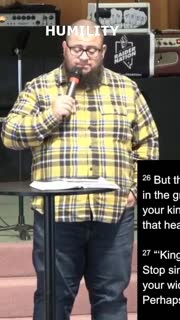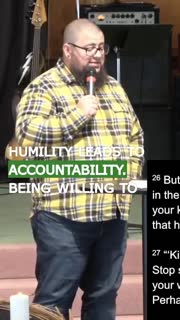Humility Over Hubris: Lessons from Nebuchadnezzar
Devotional
Sermon Summary
Bible Study Guide
Sermon Clips
1. "Have you ever been a little too full of yourself? Spend some moments. Spend some moments. Spend some moments where you're like, oh, I need to step down a peg. Maybe a little too confident in your skills and abilities. And maybe you're like, I totally got this. And then you're like, no, no, I've come in way in over my head. Or ultimately feel assured our ways. Our way is the best way. Maybe it's a recipe. Maybe it's the path you take driving somewhere. Maybe. Maybe it's how you plan out something at home and someone else does not do it your way." [37:46] (41 seconds)
2. "Hubris is when someone feels like they have the right to demand certain attitudes and behaviors from others. Now, this always has a lot of dangers. There's a loss of contact with reality if you're stuck with a lot of hubris. And. And we, we started out this, you know, few chapters where King Nebuchadnezzar is like, you tell me my dream first, as I get you, this is not how this works, King. And there's an overestimation of one's competence or accomplishments. Where King Nebuchadnezzar looks and says, all of this is mine, all of this, I'll look at what I've done for the world." [54:37] (42 seconds)
3. "Humility is coming for you either by choice or by force. Right. Hubris will eventually get to humility, but it's coming either by your choice or by force. And we're seeing this dream is by force from God. So the clear understanding that Daniel is trying to say at the end of our text today is, King, humble yourself, repent of your sins, give everything to God, and really, maybe this will change. Maybe God will change his mind." [55:42] (38 seconds)
4. "True humility is honest. Someone who is grounded in their confidence and who they are and what they're capable of. What they bring to the table. Obviously, we understand that humility is a necessity. Keeps you level-headed. That rightly, we're going to focus on God as a provider. And we have gratitude for all the good things that God has brought. And ultimately, we gather as a community that supports one another in humility. We don't all have it our way. We don't think we need anyone else. We're actually like, no, we need a community that supports us." [56:53] (40 seconds)
5. "Humility leads to accountability. Being willing to own up your mistakes and hear how you can change them. That's the worst part that humility brings us to is that we have to own our mistakes sometimes. And we're like, I don't want to. But this gives me opportunity to learn and to grow from that. And ultimately, someone who is humble has forgiveness towards themselves, let's remember that, and towards others. Understanding that we're all human and we're all doing the best that we can." [58:25] (38 seconds)
6. "When we go through hard times, sometimes it's because of our own hubris. Because we're relying everything on ourself. Because we are so self-confident that everything else is wrong. Everything else is failing you that your way is the right way. And we get left with understanding that, oh, wait, maybe not. Maybe I need to be forced into humility when something fails. Out of the blue. Out of my control. And I have to learn that lesson." [01:01:38] (30 seconds)
7. "In all things, whether it's our own or someone else's, the end of the day is understanding that God reigns. That he rules. And that we need to recognize and find ourselves under his kingdom. And be thankful for what he's doing in our lives." [01:02:26] (21 seconds)
Ask a question about this sermon
2. "Hubris is when someone feels like they have the right to demand certain attitudes and behaviors from others. Now, this always has a lot of dangers. There's a loss of contact with reality if you're stuck with a lot of hubris. And. And we, we started out this, you know, few chapters where King Nebuchadnezzar is like, you tell me my dream first, as I get you, this is not how this works, King. And there's an overestimation of one's competence or accomplishments. Where King Nebuchadnezzar looks and says, all of this is mine, all of this, I'll look at what I've done for the world." [54:37] (42 seconds)
3. "Humility is coming for you either by choice or by force. Right. Hubris will eventually get to humility, but it's coming either by your choice or by force. And we're seeing this dream is by force from God. So the clear understanding that Daniel is trying to say at the end of our text today is, King, humble yourself, repent of your sins, give everything to God, and really, maybe this will change. Maybe God will change his mind." [55:42] (38 seconds)
4. "True humility is honest. Someone who is grounded in their confidence and who they are and what they're capable of. What they bring to the table. Obviously, we understand that humility is a necessity. Keeps you level-headed. That rightly, we're going to focus on God as a provider. And we have gratitude for all the good things that God has brought. And ultimately, we gather as a community that supports one another in humility. We don't all have it our way. We don't think we need anyone else. We're actually like, no, we need a community that supports us." [56:53] (40 seconds)
5. "Humility leads to accountability. Being willing to own up your mistakes and hear how you can change them. That's the worst part that humility brings us to is that we have to own our mistakes sometimes. And we're like, I don't want to. But this gives me opportunity to learn and to grow from that. And ultimately, someone who is humble has forgiveness towards themselves, let's remember that, and towards others. Understanding that we're all human and we're all doing the best that we can." [58:25] (38 seconds)
6. "When we go through hard times, sometimes it's because of our own hubris. Because we're relying everything on ourself. Because we are so self-confident that everything else is wrong. Everything else is failing you that your way is the right way. And we get left with understanding that, oh, wait, maybe not. Maybe I need to be forced into humility when something fails. Out of the blue. Out of my control. And I have to learn that lesson." [01:01:38] (30 seconds)
7. "In all things, whether it's our own or someone else's, the end of the day is understanding that God reigns. That he rules. And that we need to recognize and find ourselves under his kingdom. And be thankful for what he's doing in our lives." [01:02:26] (21 seconds)







